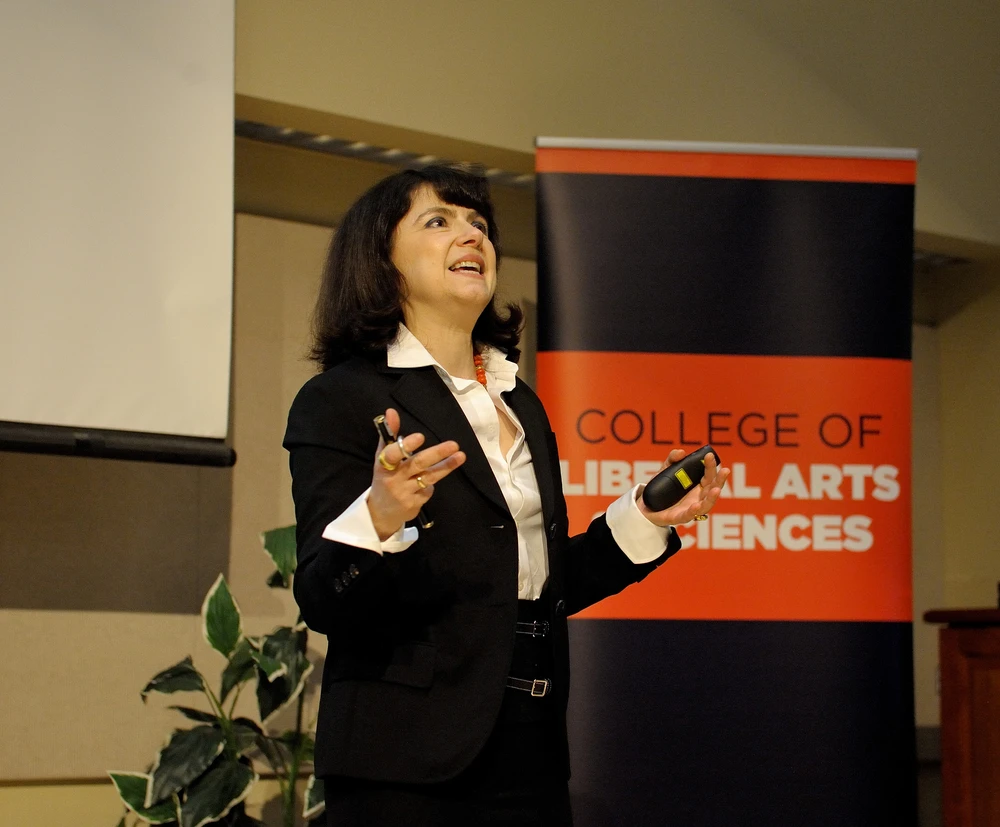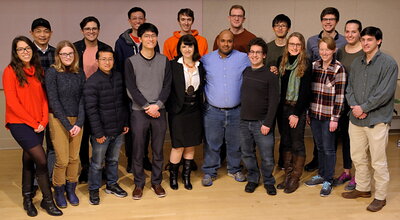
Professor M. Christina White does not fear a challenge, like delving into a difficult area of synthetic organic chemistry with ideas that test conventional wisdom.
With that fearless attitude, White’s years of research into finding ways to synthesize complex molecules more efficiently have led to groundbreaking discoveries, specifically a range of CH oxidation reactions previously considered impossible.
“I think that’s what she’s known for is making the impossible happen,” said chemistry professor Jonathan V. Sweedler, the James R. Eiszner Family Endowed Chair in Chemistry and director of the School of Chemical Sciences at the University of Illinois at Urbana-Champaign, during a recent investiture ceremony appointing White the William H. and Janet G. Lycan Professor in the School of Chemical Sciences.
The Lycans were both Illinois alumni, and the professorship honors White’s world-class achievements in synthetic organic chemistry. White shared the recognition during her investiture with friends and family, including her husband, Marty Burke, the May and Ving Lee Professor for Chemical Innovation and Professor of Chemistry, as well as colleagues from the Department of Chemistry and the College of Liberal Arts & Sciences.
Illinois chemistry professor Paul J. Hergenrother, the Kenneth L. Rinehart Jr. Endowed Chair in Natural Products Chemistry, said he admires White for “charting her own course in an extremely challenging research area, recognizing the transformative power of organic compounds in medicine and beyond and the tremendous challenge that exists in synthesizing those complex molecules.”
Her vision has been to streamline that process, directly modifying complex molecules at a late stage in a single step, he explained.
“When we started in this area, people that were considered giants in this field wrote very daunting review articles, kind of saying… this was really not possible,” White said.

Her research group has made tremendous discoveries in C-H activation using catalysts — one is now called the White catalyst.
Hergenrother said White’s discoveries stand in stark contrast to conventional wisdom prior to 2000. A unique individual with an artistic side, Hergenrother said, White incorporates creativity into her research.
“This artistic side is very apparent in her work as she’s an extremely creative thinker, who really does things her own way,” he said.
She received the 2019 American Chemical Society award for Creative Work in Synthetic Organic Chemistry, one of the society’s highest national awards. It recognized her pioneering studies on selective functionalization of aliphatic and allylic C-H bonds to form C-O, C-N and C-C bonds and discovery of catalysts that distinguish C-H bonds based on their electronic, steric and stereo electronic properties, which can be altered to change the site of oxidation. Her methods have streamlined access to important structural motifs and have been applied by many followers in the field to modify the structure of complex molecules for late-stage diversification of potential therapeutic targets.
White gives credit to former and current graduate students and post-doctoral researchers in her group who have contributed to continual discoveries that have met challenges from the research community and the pharmaceutical industry, which now embrace her methods.
“This has really been a collective group effort,” said White, who joined the chemistry faculty at the University of Illinois at Urbana-Champaign in 2005.
After completing her BA with highest honors in biochemistry at Smith College in 1992, White received her PhD in organic chemistry from Johns Hopkins University in 1998 and was an NIH Postdoctoral Fellow in the Department of Chemistry and Chemical Biology under advisor Eric N. Jacobsen at Harvard University 1999-2002.
The White group has started a whole new area that is now a very popular one called late stage functionalization.
“Pharmaceutical companies and academics are excited to use our chemistry and the chemistry that’s emerging to be able to do these atomistic changes on complex molecules to potentially look for new function,” White said.
Born in Greece, White lived in Athens until she was five years old and moved with her parents to a small town in Ohio, where they instilled important lessons that, White said, still influence her work and how her research group thinks.
White explained that there is value in embracing different perspectives, resisting the pressure to belong to a certain group or certain mentality, having an internal metric for success that is not linked to likeability and not worrying about being perfect, which can stand in the way of innovation.
“So, this was tremendous for me, certainly in my career path,” White said. “Certainly, my ability to look at leaders in the field who were telling me that this wasn’t possible and saying, ‘I’m going to try anyway,’ was really influenced by this sort of effect.”
Describing the students in her group, White said they are some of the smartest people she has ever met.
“I would say that they are very, very driven, very dedicated, very hard working, but I think the one word that I would use to describe them is that they are really fearless,” White said. “Talent does not have an ethnicity, it doesn’t have a sex, it doesn’t have a religion. Talent is everywhere, and we should capture it and embrace it, and do great things together.”